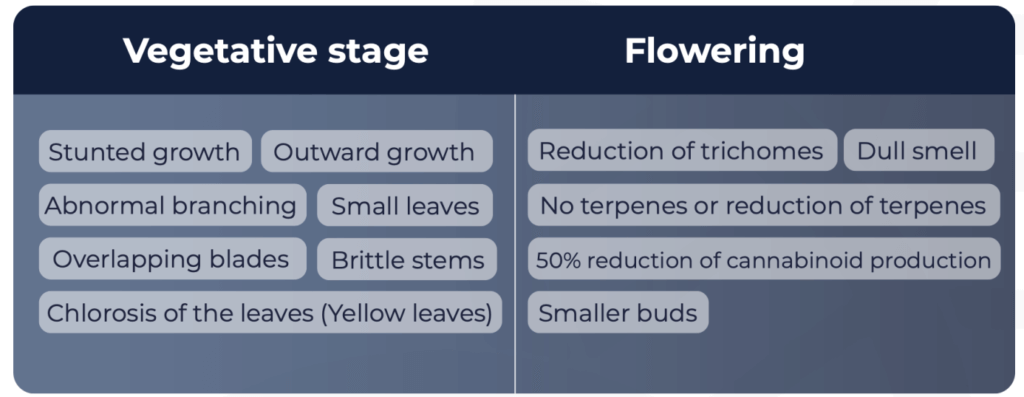By Angel Fernandez and Felipe Cisternas, MyFloraDNA
Pathogens cause diseases when looking for a host body to infect. They come in diverse forms: bacteria, fungi, worms, viruses, and also prions. Pathogens are one of the significant threats to cannabis fields. These silent visitors may cause your plants to produce fewer trichomes, small buds, or even death.
Identifying each pathogen will help to understand how each of them propagates, its symptoms, and its consequences. In this blog, you’ll find everything you need to know about:
- Hop Latent Viroid
- Botrytis (gray mold)
- Cannabis Cryptic Virus
- Lettuce Chlorosis Virus
- Alfalfa Mosaic Virus
- Beet Curly Top Virus
Hop Latent Viroid
Hop Latent Viroid (HLV) is a single-stranded infectious RNA that interferes with cannabis plant growth. Once the Hop Latent Viroid has infected the plant, the obvious sign of infection is dudding, which is when the plant grows smaller, shorter leaves in the process. HLV can also cause other symptoms, such as yellowing, and necrotic and malformed leaves.

These plants will have fewer traces of trichomes in their structure. Detecting HLV on time is crucial to avoid an existential threat to the entire garden.
Botrytis Cinerea
Botrytis Cinerea, or bud rot, is a fungus that damages the tender parts of plants in areas of high humidity. This necrotrophic fungus will invade damaged tissue. The symptoms include smaller buds, the development of gray mass spores, and brown, water-soaked spots found on leaves. A major consequence of this fungus is that it can kill cannabis plants within a week.
Lettuce Chlorosis Virus
Much like Botrytis Cinerea, Lettuce Chlorosis Virus can potentially destroy an entire garden. Likewise, Lettuce Chlorosis Virus occurs in lettuce grown in southern California. The plants change into a frail yellow color. They will become very brittle and stunted. One way to prevent the virus from spreading is to take a sample of tissue from a cannabis plant and perform qPCR tests to make sure the plant is virus free.
Cannabis Cryptic Virus
Cannabis Cryptic Virus is a double-stranded RNA virus causing subtle symptoms to plants. Some of these symptoms include smaller flower quality and stunted growth. Thus, this virus can affect plants by producing fewer terpenes, cannabinoids, and trichomes, which are three essential components that serve different purposes for cannabis plants.
Alfalfa Mosaic Virus
Another pathogen is Alfalfa Mosaic Virus, the virus starts by killing cells within a plant and this can be a potential problem for groups of plants. Aphids, small insects, will begin to infect one plant after another as they move and transmit the virus instantly. Seed transmission is also a possibility. There’s no known cure so it is best to care for plants to avoid infection from this type of virus. The symptoms are the same as many of the previous viruses and diseases; stunted growth, slower yield, and calico or yellow color is typically seen on leaves. The good thing is that this can be detected on time by performing serological tests, or antigen and antibody tests to help prove immune status.
Beet Curly Top Virus
Lastly, Beet Curly Top Virus is a dangerous plant virus containing a single-stranded DNA that can affect all kinds of plants, especially cannabis plants, giving them a serious infection. Symptoms include showing a yellow color with purple veins, leaves beginning to curl, seedlings dying out, and deformation beginning at the buds. Since this virus contains a protein carrying a unique code that allows for host cell replication if the virus is not detected on time the cannabis plants will die.
Recognizing the danger these pathogens pose to cannabis plants, and acknowledging their potential to prevent cultivation is very important for growth and success.
If you would like to know more about cannabis pathogens and how to prevent infections in your garden, download our free guides about How to treat Infected Material and The Ultimate Hop Latent Viroid Guide.
Keep growing safe and healthy cannabis!
 Author: Angel Fernandez, CEO & Co-Founder at MyFloraDNA. “It is time to fill in the gap between DNA Sciences and Agriculture. MyFloraDNA is willing to show the huge opportunities that exist for modern genetics in agriculture. Now, it is time for another agricultural revolution”
Author: Angel Fernandez, CEO & Co-Founder at MyFloraDNA. “It is time to fill in the gap between DNA Sciences and Agriculture. MyFloraDNA is willing to show the huge opportunities that exist for modern genetics in agriculture. Now, it is time for another agricultural revolution”
Co-author: Felipe Cisternas, Intern at MyFloraDNA
Editor: Ashlyn East, Intern at MyFloraDNA
About MyFloraDNA: We are a genomic laboratory based in Woodland California, delivering modern genomics for the cannabis industry. MyFloraDNA provides data-driven decisions to help breeders increase their plant yields.
Our services include Trait detection (cannabinoid profile and sex/gender ID), Pathogen Detection, and Genetic Validation Services. We offer breakthrough solutions using the inner power of your plants.
Who asks if you think you have an infection in your garden?
We highly recommend you consult with DNA Laboratories. They will guide you through the process, test your plants, and let you know if they are infected with HLV or not.


Follow NCIA
Newsletter
Facebook
Twitter
LinkedIn
Instagram
–